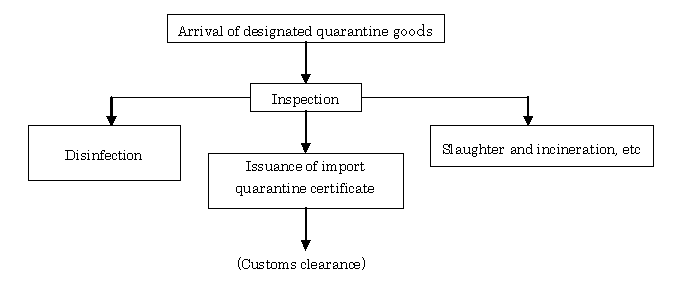
3. Domestic Animal Infectious Diseases Control Law

v. Testing Organizations
Presently, animal quarantine is being implemented for imported animals and animal products at the Animal Quarantine Services, headquarters of which is located in Yokohama, along with 6 branches located at Narita, Chubu, Kansai Internationl Airport and Kobe, Moji and Okinawa port, 17 local branches in other major air and sea ports, and 9 other offices.
| Name and Department of Animal Quarantine Station | Address | Telephone |
| Animal Quarantine Service (Headquarter) | 11-1 Haramachi, Isogo-ku, Yokohama 235-0008 | 81-45-751-5921 |
| Narita Branch (No. 1 PTB) |
1-1 Goryo Bokujo, Sanriduka, Narita-shi, Chiba 282-0011 | 81-476-32-6664 |
| Narita Branch (No. 2 PTB) |
1-1 Aza Furugome, Furugome, Narita-shi, Chiba 282-0004 | 81-476-34-2342 |
| Narita Branch (No. 3 PTB) |
254-1 Aza Nishihara, Oaza Tennami, Sanriduka, Narita-shi, Chiba 282-0111 | 81-476-32-6651 |
| Narita Branch (No. 4 PTB) |
254-1 Aza Nishihara, Oaza Tennami, Sanriduka, Narita-shi, Chiba 282-0111 | 81-476-32-6658 |
| Chubu Airport Branch | CIQ Bldg., 1-1 Centrair, Tokoname-shi, Aichi 479-0881 | 81-569-38-8577 |
| Kansai Airport Branch | CIO Godo Chosha, 1 Senshu Kuko Naka, Tajiri-cho, Sennan-gun, Osaka 549-0011 | 81-724-55-1956 |
| Kobe Branch | Kobe Disaster Prevention Godo Chosha 3F, 1-4-3 Wakihama Kaigan-dori, Chuo-ku, Kobe 651-0073 | 81-78-222-8990 |
| Moji Branch | Moji Kowan Bldg., 1-3-10 Nishi-Kaigan, Moji-ku, Kitakyushu-shi, Fukuoka 801-0841 | 81-93-321-1116 |
| Okinawa Branch | Naha Kowan Bldg., 2-11-1 Minato-machi, Naha-shi, Okinawa 900-0001 | 81-98-861-4370 |
(5) HIGHLIGHTS OF THE RECENT AMENDMENT
The Enforcement Regulations were amended in September 2005 for prevention
of Highly Pathogenic Avian Influenza (HPAI). Thus, ostriches and Anseriformes
are classified as designated quarantine goods.
(6) REFERENCE INFORMATION
(Liaison Offices for Further Information)
Quarantine operations group, Office of International Health Affairs,
Animal Health Division, Food Safety and Consumer Affairs Bureau, Ministry of Agriculture, Forestry and Fisheries
Tel: 81-3-3502-8295 http://www.maff.go.jp
Animal Quarantine Service, Ministry of Agriculture, Forestry and Fisheries
Tel: 81-45-751-5921 http://www.maff-aqs.go.jp